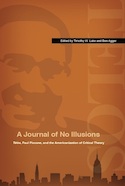A Journal of No Illusions: Telos, Paul Piccone, and the Americanization of Critical Theory is now available from Telos Press. Maxwell Woods talked with contributor Robert D’Amico about his history with Telos and the journal’s influence on his intellectual outlook.
Maxwell Woods: How did your article “What is Federalism? On Piccone’s Late Political Philosophy” fit into your own intellectual outlook?
 Robert D’Amico: I have always been interested in political philosophy in the widest sense of that term. Telos was born out of a focus on Marx and Marxism as political theories within European philosophy. Like the journal, I abandoned that framework in time, before the journal did I think, but it did me a lot of good to think through those issues and the journal made some of the more interesting work on it available. The focus on federalism and populism came late in Paul’s life. I can’t say that they are part of my thinking, but writing this piece gave me an opportunity to work through what Paul and I often talked about in the times I saw him in NYC before his death. Also I think that is what Paul would have liked, not a remembrance of him but an argument.
Robert D’Amico: I have always been interested in political philosophy in the widest sense of that term. Telos was born out of a focus on Marx and Marxism as political theories within European philosophy. Like the journal, I abandoned that framework in time, before the journal did I think, but it did me a lot of good to think through those issues and the journal made some of the more interesting work on it available. The focus on federalism and populism came late in Paul’s life. I can’t say that they are part of my thinking, but writing this piece gave me an opportunity to work through what Paul and I often talked about in the times I saw him in NYC before his death. Also I think that is what Paul would have liked, not a remembrance of him but an argument.
Woods: You discuss at some length Piccone’s concept of federalism. What other concepts in Telos were of significance for you?
D’Amico: The articles I tended to read in Telos, when not doing editing work and then reading a lot more, were those on the so-called critical theory tradition and on the history of political philosophy, or just on philosophy. I wouldn’t classify them by concepts.
Woods: What personalities at Telos have you interacted with? How did these interactions shape your intellectual world?
D’Amico: Of those who remained in contact with the journal, I knew and met at times with Russell Jacoby, Russell Berman, Gary Ulmen (who I got to know much better than perhaps any of the others, since he lived in NYC and was putting enormous time and energy into the journal in Paul’s final years, sustaining both Paul and the journal), Tim Luke, Frank Adler—I know I am leaving some names out, I fear. It was a great community of sharp thinkers whom I always enjoyed talking with and reading, but of course I usually only saw them for some event such as one of the Telos conferences that I attended fairly irregularly. I remember a couple of cold winter visits to the town of Candor though.
Woods: How has your own intellectual worldview changed since writing that article?
D’Amico: No, that article is pretty recent; my worldview doesn’t change that fast. I am worried about the problems raised in that article even more now, since I see populism as a more destructive political movement than I considered it when doing the article. But my orientation to all of these matters is as an academic, as a teacher of philosophy. The last thing in the world I would want or even consider is to become involved in any political movement—I can hear Paul laughing now at the mere thought of me as a political activist.



